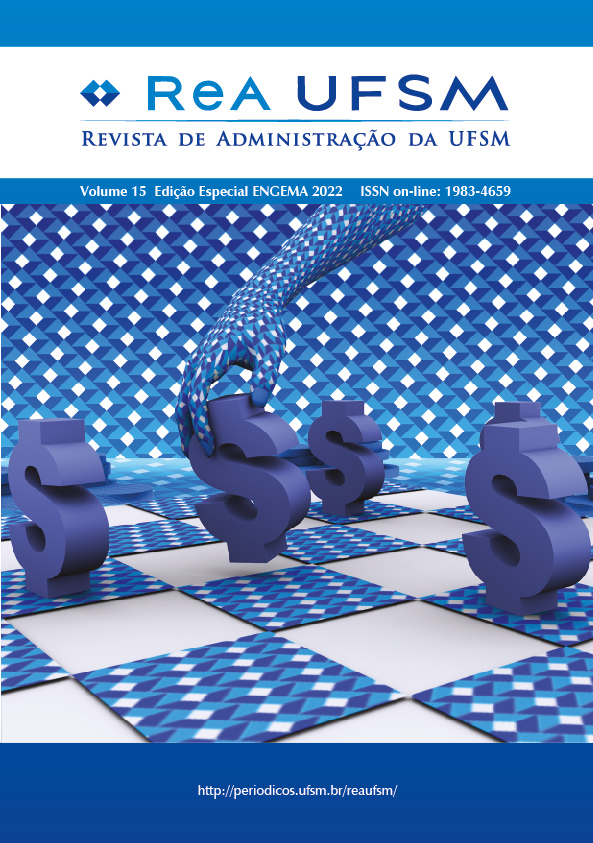APLICACIÓN E IMPACTOS DE LOS OBJETIVOS DE DESARROLLO SOSTENIBLE EN LAS GRANDES INDUSTRIAS BRASILEÑAS
DOI:
https://doi.org/10.5902/1983465969429Palabras clave:
Desarrollo sostenible, Agenda 2030, Objetivos de Desarrollo Sostenible, Industria, rasilResumen
Objetivo: Verificar si las grandes empresas privadas del sector industrial que operan en Brasil cumplen con los Objetivos de Desarrollo Sostenible (ODS) establecidos por la ONU en la Agenda 2030, con el fin de retroalimentar a la sociedad sobre el desempeño empresarial en la agenda de desarrollo sostenible. Métodos: La investigación se caracteriza por ser cualitativa, de carácter exploratorio y descriptivo, y de procedimiento documental. El análisis de contenido se eligió como técnica de investigación de los datos recopilados. Resultados: Existe un cumplimiento parcial de los ODS por parte de las 20 mayores empresas privadas del sector industrial que han publicado recientemente informes de sostenibilidad. Conclusiones: La presentación de informes es una parte importante de la sostenibilidad en las empresas, pero presentarlos anualmente no transforma a la empresa en una organización sostenible. Por ello, se sugieren cuestiones que pueden acercar la actuación de las empresas a las dimensiones propuestas en la Agenda 2030. Asimismo, se recomienda la estandarización de los ODS como vías para la implantación de actitudes sostenibles en las empresas y, en consecuencia, para la construcción de informes de sostenibilidad cada vez mejores. Esto puede favorecer los análisis comparativos entre organizaciones similares y la aplicación de prácticas responsables capaces de responder a los retos del siglo XXI.
Descargas
Citas
Almeida, J., & Premebida, A. (2014). Histórico, relevância e explorações ontológicas da questão ambiental. Sociologias, 17(35), 14-33. http://dx.doi.org/10.1590/S1517-45222014000100002
Bardin, L. (2009). Análise de conteúdo. Lisboa: Edições 70.
Bowen, H. R. (1953). Social responsibilities of the businessman. New York: Harper & Row.
Brasil. Lei nº 10.165, de 27 de dezembro de 2000. Disponível em: http://www.planalto.gov.br/ccivil_03/leis/L10165.htm.
Brault, M. A. et al. (2020). Measuring child survival for the Millennium Development Goals in Africa: what have we learned and what more is needed to evaluate the Sustainable Development Goals?, Global Health Action, 13(1). https://doi.org/10.1080/16549716.2020.1732668
Carson, R. (1968). Primavera Silenciosa. São Paulo: Melhoramentos.
Cavalcanti, C. (2010). Concepções da economia ecológica: suas relações com a economia dominante e a economia ambiental. Estudos Avançados, 24(68), 53-67. http://dx.doi.org/10.1590/S0103-40142010000100007
CEBRAP. (2016). Métodos de Pesquisa em Ciências Sociais. Bloco Qualitativo. São Paulo: Sesc-CEBRAP.
Davis, K. (1960). Can business afford to ignore social responsibilities? California Management Review, 2, 70-76.
Dias, R. (2019). Gestão ambiental: responsabilidade social e sustentabilidade. São Paulo: Atlas.
Froehlich, C. (2014). Sustentabilidade: dimensões e métodos de mensuração de resultados. DESENVOLVE: Revista de Gestão do Unilasalle, 3(2), 151-168. Disponível em: https://revistas.unilasalle.edu.br/index.php/desenvolve/article/view/1316/1182.
Georgescu-Roegen, N. (2012). O decrescimento: Entropia, ecologia e economia. São Paulo, SP: Senac.
Gil, A. C. (2019). Métodos e técnicas de pesquisa social (7a ed.). São Paulo, Atlas.
Machado, D. Q., & Matos, F. R. N. (2020). Reflexões sobre desenvolvimento sustentável e sustentabilidade: categorias polissêmicas. REUNIR, 10(3), 14-26. Disponível em: https://reunir.revistas.ufcg.edu.br/index.php/uacc/article/view/771.
McNeill, J. R. (2000). Something new under the sun: an environmental history of the twentieth-century world. New York, London: W. W. Norton & Company, Inc.
Meadows, D. H., Meadows, D. L., & Randers, J. (1972). Os limites do crescimento. São Paulo: Perspectiva.
Melgar-Melgar, R. E., & Hall, C. A. S. (2020). Why ecological economics needs to return to its roots: The biophysical foundation of socio-economic systems. Ecological Economics, 169, 1-14. https://doi.org/10.1016/j.ecolecon.2019.106567
Moraes, N. R., Santos, A. R., Hamada, C. S., Ruiz, S. C. M. (2017). Responsabilidade social empresarial, dever ou ética? Conceitos, evolução e abordagens. Aturá - Revista Pan-Amazônica de Comunicação, 1(3), 235-256. Disponível em: https://sistemas.uft.edu.br/periodicos/index.php/atura/article/view/4517.
Mozzato, A. R., & Grzybovski, D. (2011). Análise de conteúdo como técnica de análise de dados qualitativos no campo da administração: potencial e desafios. Revista de Administração Contemporânea, 15(4), 731-747. Disponível em: http://www.scielo.br/pdf/rac/v15n4/a10v15n4.
Munda, G. (1997). Environmental Economics, Ecological Economics, and the Concept of Sustainable Development. Environmental Values, 6(2), 213-233. Disponível em: https://www.jstor.org/stable/30301601.
Nações Unidas Brasil. (2015). Transformando Nosso Mundo: A Agenda 2030 para o Desenvolvimento Sustentável. Disponível em: https://nacoesunidas.org/pos2015/agenda2030/
Nascimento, E. P. (2012). Trajetória da sustentabilidade: do ambiental ao social, do social ao econômico. Estudos Avançados, 26(74), 51-64. http://dx.doi.org/10.1590/S0103-40142012000100005
Oliveira, T. M. V. (2001). Amostragem não probabilística: adequação de situações para uso e limitações de amostras por conveniência, julgamento e quotas. Administração On Line, 2(3), 1-10.
Organização das Nações Unidas. (2015). The Millennium Development Goals Report. Disponível em: https://www.un.org/millenniumgoals/2015_MDG_Report/pdf/MDG%202015%20PR%20Key%20Facts%20Global.pdf. Acesso em: 03 set. 2019.
Raworth, K. (2019). Economia Donut: Uma alternativa ao crescimento a qualquer custo. São Paulo: Zahar.
Roma, J. C. (2019). Os Objetivos de Desenvolvimento do Milênio e sua transição para os Objetivos de Desenvolvimento Sustentável. Ciência e Cultura, 71(1), 33-39. Disponível em: http://cienciaecultura.bvs.br/scielo.php?script=sci_arttext&pid=S0009-67252019000100011&lng=en&nrm=iso.
Romeiro, A. R. (2018). Economia ou Economia Política da Sustentabilidade. In May, P. H. (Org.). Economia do meio ambiente: teoria e prática (3a ed.). Rio de Janeiro: Elsevier.
Romeiro, A. R. (2012). Desenvolvimento sustentável: uma perspectiva econômico-ecológica. Estudos Avançados, 26(74), 65-92. http://dx.doi.org/10.1590/S0103-40142012000100006
Rosati, F., & Faria, L. G. D. (2019). Addressing the SDGs in sustainability reports: The relationship with institutional factors. Journal of Cleaner Production, 215, 1312-1326. https://doi.org/10.1016/j.jclepro.2018.12.107
Sachs, I. (2008). Desenvolvimento: Includente, Sustentável, Sustentado. Rio de Janeiro: Garamond.
Sachs, J. (2015). The Age of Sustainable Development. New York, NY: Columbia University Press.
The Economist. (2020). The roots of the problem: a study names firms who buy products from areas with deforestation. Disponível em: https://www.economist.com/graphic-detail/2020/06/11/a-study-names-firms-who-buy-products-from-areas-with-deforestation.
Veiga, J. E. (2010). Desenvolvimento sustentável: o desafio do Século XXI. Rio de Janeiro: Garamond.
Veiga, J. E. (2015). Para entender o desenvolvimento sustentável. São Paulo: Editora 34.
World Comission on Enviroment and Development. (1987). Our Common Future. Oxford: Oxford University Press.
Descargas
Publicado
Cómo citar
Número
Sección
Licencia
Derechos de autor 2022 Revista de Administração da UFSM

Esta obra está bajo una licencia internacional Creative Commons Atribución 4.0.
Hasta 2023, los derechos de autor fueron transferidos por los autores a ReA/UFSM. A partir de 2024, los autores de artículos publicados por ReA/UFSM conservan los derechos de autor de sus obras.
La revista adopta la licencia Creative Commons (CC-BY 4.0), que permite reutilizar y distribuir los artículos sin restricciones, siempre que se cite adecuadamente el trabajo original.






